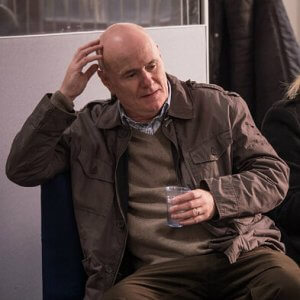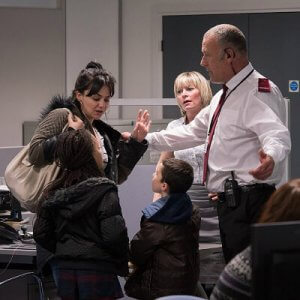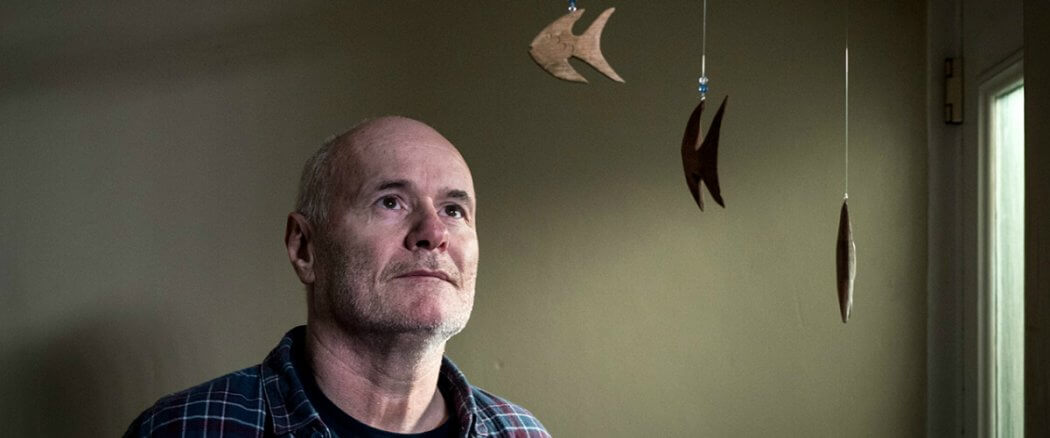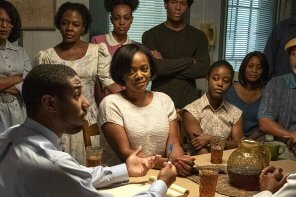We all have been there… stuck in the maze of some type of bureaucracy trying to figure out where we go next. In this day if we are technically adept most of us can eventually figure where to turn, who to contact, or what alternative avenue to take that will get us out of our dilemma. But what if we are not? Or if the rules are so nonsensical that there is no way out? I, Daniel Blake is about a 59 year old Brit carpenter in Newcastle who has had a heart attack and is indefinitely prohibited by his physician from working. However, when he applies for long-term benefits he falls into a maze of contradictory governmental regulations which are completely beyond his understanding and logic.
Running in a Rat Maze
Daniel (played in an auspicious feature-length cinematic debut by 60 year old comedian Dave Johns) is shown repeatedly, dutifully walking to and from the Department of Work and Pension Jobcentre where the staff asks him ridiculous questions that he has already answered on a “fifty-two page form.” Indeed, the film opens with a voice-over of a black screen where Daniel is asked “just a couple of questions to establish your eligibility for his Employment Support Allowance” by a “healthcare professional appointed by the Department of Work and Pensions.” With increasing irritation he answers one ridiculous question after another having nothing to do with his cardiac disability (“Do you ever experience any loss of control leading to extensive evacuation of the bowel?” “No, but I cannot guarantee there will not be a first if we do not get to the point.”) It is amusing but eventually heartbreaking as one hears Daniel’s patience strained beyond endurance by this clerk who clearly has no idea what she is doing other than asking rote questions from her inflexible form without the slightest hint of understanding or compassion. Johns portrays his character flawlessly, naturalistically without over-dramatization or hysterics.
 In a few days Daniel gets a letter telling him his benefits have been denied after the interview (no physical exam was performed). When he calls to protest the decision, he repeatedly hears the all-to-familiar, recorded message “We are sorry, but all our customer service agents are busy at the moment. Please hold and we will answer your call when one becomes available” interspersed with “Thank you for waiting. Please continue to hold and we will answer your call as soon as possible” and the maddeningly repetitive opening allegro of Vivaldi’s “The Four Seasons — Spring” — over and over. After waiting for one hour and forty-eight minutes he finally reaches a “customer service agent” who tells him in his non-caring drone that Daniel cannot appeal the decision until his case manager calls him to “explain the decision” despite the fact that the decision has already been made. Until the case manager calls him, which “should have happened before you got the letter,” he will be without benefits. And no one can tell him when the case manager will call as the manager’s case load “is very busy.”
In a few days Daniel gets a letter telling him his benefits have been denied after the interview (no physical exam was performed). When he calls to protest the decision, he repeatedly hears the all-to-familiar, recorded message “We are sorry, but all our customer service agents are busy at the moment. Please hold and we will answer your call when one becomes available” interspersed with “Thank you for waiting. Please continue to hold and we will answer your call as soon as possible” and the maddeningly repetitive opening allegro of Vivaldi’s “The Four Seasons — Spring” — over and over. After waiting for one hour and forty-eight minutes he finally reaches a “customer service agent” who tells him in his non-caring drone that Daniel cannot appeal the decision until his case manager calls him to “explain the decision” despite the fact that the decision has already been made. Until the case manager calls him, which “should have happened before you got the letter,” he will be without benefits. And no one can tell him when the case manager will call as the manager’s case load “is very busy.”
“He’ll give you a call when he gets a chance.”
“When?”
“I don’t know, sir.”
The fact that Daniel’s future is in the hands of the unnamed “decision maker” smacks of Orwellian irony. As Daniel tells the one, somewhat helpful case worker (who is chastised by her manager when she tries to help him) “It’s just so bloody confusing… all the jargon. I mean, there must be some mistake. I’m just going round and round in circles.”
Digital by Default
Daniel is told he must get into the Job Seekers program if he expects any stipend until his appeal is heard, and to do that he has to fill out another form. When asked for the form he is told he has to apply online.
“I cannot do that. Listen, you know, you give me a plot of land I can build you a house. But I’ve never been anywhere near a computer.”
“Do you know what, we’re digital by default.”
“Oh here we go again. I hear this all the time on the phone — ‘I’m digital by default.’ Well, I’m pencil by default.”
“There’s a special number if you’ve been diagnosed as dyslexic.”
“Right, can you give us that? ‘Cause with computers I’m dyslexic.”
“You’ll find it online sir. I must ask you to leave now if you’ve got no appointment.”
On a particularly frustrating day at the Jobcentre he watches as a 20s mother of two is refused the chance to “sign on” after becoming lost in the unfamiliar city and arriving late. The near-to-tears Katie (Hayley Squires in a quietly moving performance) has been moved to Newcastle with her two children from a hostel in her native London because of a shortage of social housing in the capital. Daniel takes the side of Katie in the Jobcentre, protesting the injustice of her workers decision to not see her. In the end both she and Daniel are escorted out of the office. He helps her carry a few meager supplies to her nearby apartment which is in bad repair and has no heat because she cannot afford fuel.
 Back at his modest apartment, Daniel shouts at his neighbors about their garbage being left out (in humorous fashion) and their dogs defecating in the shared yard while their owners are looking the other way. A widower who lost his love Molly years ago, and childless, Daniel is the prototypical “get-off-of-my-lawn,” cranky old man. But in Katie, Daniel sees someone more in need than he and becomes a help to her, using his years of carpentry experience to do small and innovative repair jobs. And Daniel inevitably develops a friendship with the two young children who never see their fathers. Despite not being able to work he finds meaning in “being there” for them. And from that point the plot about two people who, it seems, the world no longer cares moves on in small vignettes to its (somewhat easily predicted but heartfelt) conclusion. They meet people who show each of them kindnesses and grace, but the rules of the social services agencies they deal with are cruel and unbending. The scene in a food bank will stick with you a long time.
Back at his modest apartment, Daniel shouts at his neighbors about their garbage being left out (in humorous fashion) and their dogs defecating in the shared yard while their owners are looking the other way. A widower who lost his love Molly years ago, and childless, Daniel is the prototypical “get-off-of-my-lawn,” cranky old man. But in Katie, Daniel sees someone more in need than he and becomes a help to her, using his years of carpentry experience to do small and innovative repair jobs. And Daniel inevitably develops a friendship with the two young children who never see their fathers. Despite not being able to work he finds meaning in “being there” for them. And from that point the plot about two people who, it seems, the world no longer cares moves on in small vignettes to its (somewhat easily predicted but heartfelt) conclusion. They meet people who show each of them kindnesses and grace, but the rules of the social services agencies they deal with are cruel and unbending. The scene in a food bank will stick with you a long time.
A Productive Socialist Artist
Directed by long-time socialist and octogenarian Ken Loach, veteran director of over 50 films (most of which are little known in the United States), I, Daniel Blake is another of his angry cries for humanism and a protest of the depersonalization of large governmental bureaucracies. This quiet film is shot with overcast skies and filled with working class people trying to eke out a living. There are no glamorous steel and glass office buildings or fabulous dwellings of the super-rich, just row houses and humble apartment buildings. There is no soundtrack to speak of (a few plaintive notes introduce one particularly poignant scene and then quickly fades)… only traffic and industrial sounds, or the creaks, drips, and squeaks of old apartments. The rooms are dimly lit. The camera frequently dwells on passerby and people seated, waiting — all who appear to be non-actors picked from the common inhabitants of the dingy part of town where the film was shot (in Newcastle). And yes, it has a three-legged dog appear all so briefly (a Loach trademark).
In 2006 Loach took his up-to-now most popular film The Wind that Shakes the Barley to Cannes and came away with the Palme d’Or. And has there ever been a more potent anti-violence film about the Irish War of Independence? In 2015 he took to Cannes this much different film, but yet again walked away with the Palme d’Or. The film also won “Best British Film” in the BAFA’s this year and both acting leads have won numerous awards for independent films. The naturalistic acting of both leads makes the plot entirely absorbing and believable. Only in the very last few scenes could I, Daniel be accused of falling into melodrama, but the emotions are well-earned. There are a few gaps in the narrative plot but none that cannot be overlooked. Viewing I, Daniel Blake will leave you with a sobering perspective of how the poor are batted about in our society, whether on the other side of the pond or ours.
Am I Abandoned — Unknown?
Contemplating on the impersonal nature of so much of what we deal with today, I thank God for my steady employment working among people I know and care about, my (very) small circle of friends, my spouse who is with me for near unto 50 years now, and the Holy Spirit who dwells within me to tell me I am loved and watched over. We Christians can celebrate a God who, as is sung in one of my favorite praise and worship songs, “knows my name.” I wish, if nothing else, more would know that personalization.
Find I, Daniel Blake if you can (it is currently available for viewing as a rental on Direct TV but hardly anywhere else). Watch it with someone you love and then reach out to someone who is lonely and having a difficult time dealing with the world. You will be a better person and, if it fits, a better Christian.





